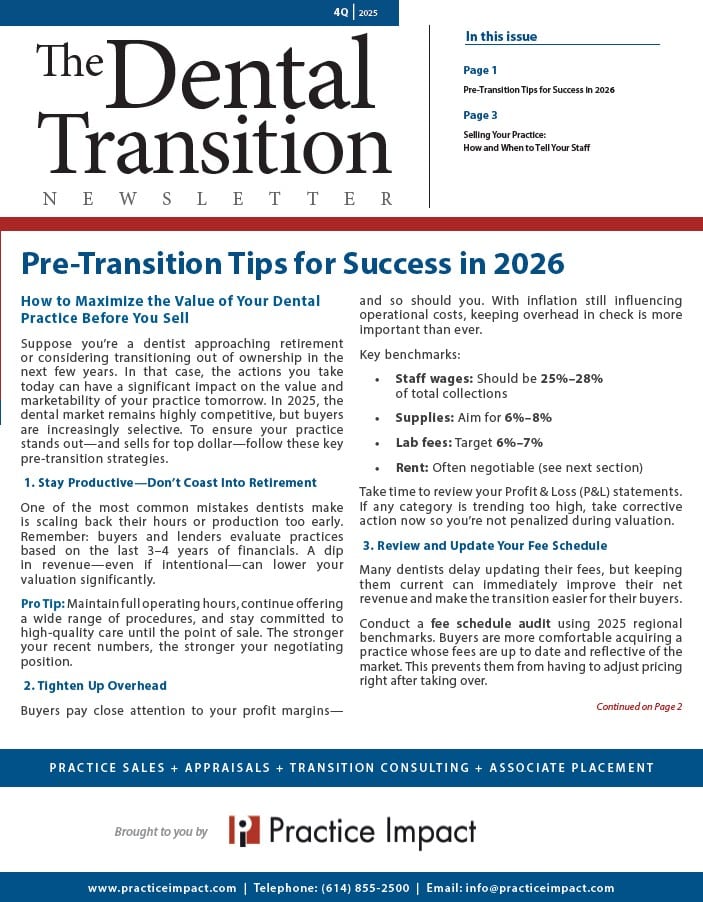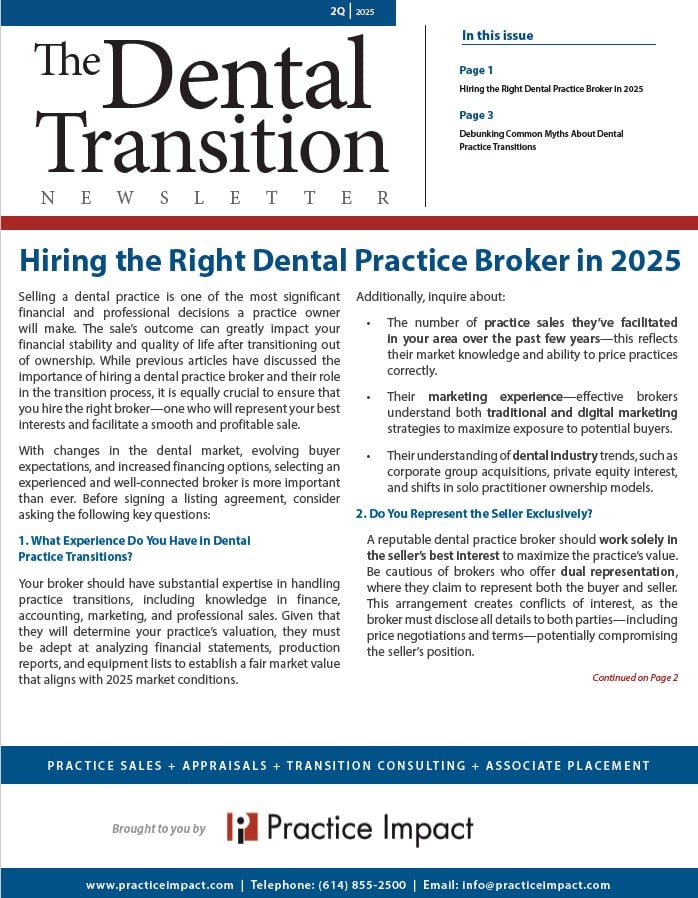The Path to Success for a Young Dentist
In today’s world, it is very unlikely that a dentist will graduate from dental school and have immediate success and begin building wealth through a practice purchase or startup. It does happen, but these days, most dentists choose a slower path towards practice ownership in order to build their clinical skills and speed and also to learn the business aspect of dentistry before jumping into ownership. Most young dentists choose to work as an associate first and then make the leap into some sort of practice ownership.
If you choose to find an associate position after obtaining your license you should choose one carefully. Making the wrong choice could impact the type of patients you treat, your practice philosophy, and the location you can practice in after you decide to leave the associate position. Before accepting an associate position be sure to ask the following questions:
- Do you want just a job or the future potential to purchase an interest in the practice?
- What type of dentistry do you wish to do?
- What types of payment and insurance does the practice participate in and accept?
- How will you be compensated? (based on production/collection? Will you pay lab fees? Benefits?)
- How will the restrictive covenant impact your plans for practicing at your own or another practice in the future?
- Will the owner share patients or are you expected to market and find your own patient base?
- Are there enough active patients to support another doctor in the practice?
- Are the owner and practice financially stable?
When should you make the transition to practice owner? Deciding when you are ready and able to be the owner of your own dental practice is a big decision that many dentists struggle with making. The best way for a dentist to build wealth is through ownership, but the dentist must be ready clinically and financially. There are three ways to become a practice owner:
- Purchase an existing practice
- Buy into an existing practice (partnership)
- Do a practice start up
Before making the decision on how to become an owner, you need to understand what you want in a practice and where you want to practice. The following questions will be helpful to ask yourself when making this decision:
- What type of practice do you want to own-general, a fee for service, cosmetic?
- Where do you want to live?
- Do you want to live and work in the same community or are you willing to commute?
- What attributes are you looking for in a community where you will practice?
- Do you wish to own real estate now?
- How much do you need to earn from your practice?
- Do you want a solo practice or would you prefer to join a group practice or have a partner?
- What is the saturation level of competing dentists in the area you are considering?
- Do you want a practice in which the selling dentist will stay on for a short or long transition period?
- Have you hired advisors such as an attorney and accountant to help you evaluate the practice and the deal?
Once you answer all of the questions above you need to then give yourself an honest answer to the following question: Are you ready to lead a practice and make all of the business decisions for the practice and staff? Being a dentist and business owner are two very different jobs and you have to be ready to do both on a daily basis. In order to be a successful business owner you must make sure you are ready for the following:
- Learn how to become a good leader, for some this comes naturally, but for others, it takes work and seminars and advisors are a good resource to help you learn.
- Make all staffing decisions for your office, including hiring and firing.
- Find ways to motivate your staff on a daily basis and set goals for individual staff members and the office as a whole.
- Understand how to read your financial statements and know what they mean for your practice. You should know the financial aspects of your practice and truly understand if it is a profitable practice.
- Know how to manage your accounts receivables. You need to understand the importance of a good patient financial policy, how to enforce it, and find ways to keep your accounts receivables to a minimum.
- Know how much you can produce in a day, how much your hygienist produces per day and ensure that your staff is scheduling patients that will maximize your production time.
- How much are you going to pay your staff? Salaries are a big cost in a dental practice and you want to pay enough to ensure you have a solid staff who will not leave the practice for another position, but do not want to pay them so much that your practice is not profitable or cash flows poorly.
- Do you have a marketing plan in place? You must be ready to market the practice-advertise, sponsor local teams and activities, offer referral plans, etc. to ensure that you are constantly acquiring new patients.
- Understand how much do you should be spending on supplies? Having too many supplies on hand can actually cost you money if they expire or if you have too many things stockpiled in your storage space. Reversely, having too few supplies can hurt you if something is needed but out of stock in your office. You need to manage the number of supplies that you keep on hand and also the amount that you and your staff use for each patient.
No matter which direction you decide to go in order to pursue your dental career, whether it be as an associate, a partner, or a solo practice owner, one thing you must do is make sure you are living within your means.
- Although you are making a decent wage, it does not give you a license to live as if you have been making that wage for the last 20 years. As a new dentist, you most likely have some extra expenses. Most young dentists have debt from both their undergraduate studies and dental school. This debt can be significant for many dentists after so many years in school and you need to factor in the repayment of this debt to set yourself up for a stable financial future.
- This is also the time when many dentists are starting families, buying homes, cars, and other big purchases. The temptation to buy something greater than your current means is great, but the wise thing to do is be responsible and stay within your means. Whether that means waiting to purchase a home, purchasing a more modest home and car, it will benefit you in the long run.
As you can see, even after you finish dental school and begin your career, there will still be many decisions and struggles in your career. With the proper planning, these challenges will be much easier. Enlisting the help of qualified advisors can also be a benefit to you. If you ever have any questions or would like advisor referrals for an attorney, accountant, banker or other advisors please contact Practice Impact.





